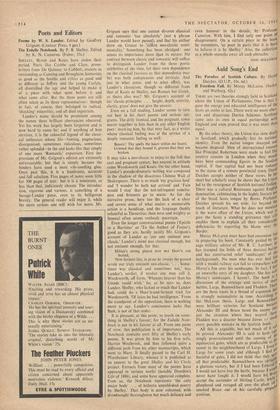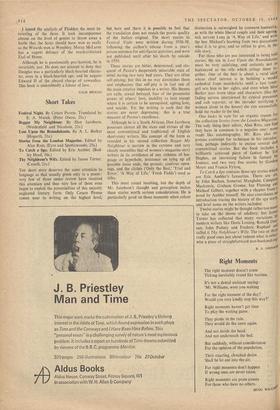Auld Song's End
If Freedom Fail. By Moray McLaren. (Seeker and Warburg, 42s.) THERE are two theories strongly held in Scotland about the Union of Parliaments. One is that
gave the energy and educated intelligence of the Scots an outlet at last. There were no more abor•
tive and disastrous Darien Schemes. Scotland came into its own in equal partnership with England and soon proved that it was more thall equal.
By the other theory, the Union Was slow death to Scotland, which gradually lost its national identity. Even the native tongue decayed and became despised. Men of international renown like Principal Robertson were made to feel like country cousins in London when they would have been commanding figures in the Scottish, capital, if that capital had not been reduteel to the status of a remote provincial town. Davi!'
Daiches accepts neither of these views. In fos short but scholarly essay, he shows that the Unit°
led to the resurgence of Scottish national feelint
There was a cultural Resistance against English domination, culminating in the highly literary use of the braid Scots tongue by Burns. Professor Daiches spreads his net wide, far beyond the reach of literature. What he does not mention is the worst effect of the Union, which was give the Scots a standing grievance that stil' enables them to explain all their considerable deficiencies by exporting the blame over the Border.
Moray McLaren must have had enormous full in preparing his book. Constantly guided bY the sage military advice of Mr. R. C. Lorimer, lie has tramped the fields of three decisive battles and has constructed relief `sandscapes' of the battlegrounds. No man who has ever had AT with a model railway can fail to sympathise witi Moray's fun over his sandscapes. In fact, I fee. an unworthy envy of my daughter. She has Seel Moray's sandscapes. I haven't. The book is discussion of the strategy and tactics of three battles, Largs, Bannockburn and Flodden. .111,t are the three knots in a thread of argument irTo is strongly nationalistic in tone. AccOrding „ the McLaren thesis, Largs and Bannockburi; were brilliant victories for Scotland bec3n50 Alexander HI and Bruce lured the enenlY int just the situation where they wanted thetIclic. Flodden was a disaster because James ,/ rtla every possible mistake in the Scottish book. All this is arguable, but not much of it Cen, be proved. Alexander III is said to have ci:thc ningly procrastinated until the coming of ,u'e equinoctial gales, which are as predictable as 11:0 sunset in the neighbourhood of Largs. I lived Largs for some years and although I had itrue basinful of gales, I did not think that they Wel, all that predictable. Bannockburn was certailyi a glorious victory, but if I had been Edward 0 I would not have lost the battle, because I w°1jce never have fought it. I would have let Bru accept the surrender of Stirling Castle, wh, plundered and ravaged all over the place iiA smoked Bruce out of his carefully prepar' position. I found the analysis of Flodden the most in- teresting of the three. It took incompetence almost on the level of genius to throw away a battle that the Scots should have won as easily as the Wizards won at Wembley. Moray McLaren has a cogent defence of the much-criticised Earl of Home.
Although he is passionately pro-Scottish, he is invariably just. He does not attempt to deny that Douglas was a particularly black-hearted charac- ter, even in a black-hearted age, and he acquits Edward II of the absurd charge of cowardice. This book is undoubtedly a labour of love.
COLM BROGAN



































 Previous page
Previous page